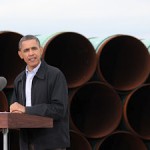
As Obama decides on Keystone, Canada forced to review our history of resource exploitation.
by Mel Watkins
A New York Times editorial on March 10 said “No to the Keystone pipeline.” Opponents of the pipeline, like myself, feel good. We can at least hope that the editorial has increased the odds that Obama will also say no — but whether the odds change enough to matter is impossible to say.
Problem is, feeling good or better is not good enough. There's something wrong with this story. It's as if the decision about the pipeline is no longer our decision. If Obama says no, that's the end. If he says yes, that's the end too. Isn't the definition of shirking responsibility that you have given away the power to make a decision on something that really matters to you?
The situation is all too Canadian. Not our decision. As if we were to say, “We just sell the asbestos; others who choose to buy it, are responsible for what happens.” Only now have we finally owned up to what we've been doing with asbestos and finally agreed to stop selling it.
Recall the injunction "caveat emptor:" Let the buyer beware. Meanwhile the seller counts the money and washes his hands.
Canada has lived by exporting resources since the day we elbowed aboriginal people aside. In the process, we’ve developed some very bad habits.
There's nothing wrong with selling resources and becoming prosperous thereby. The question is whether we do it in a good and ethical way.
Canada has lived by exporting resources since the day we elbowed aboriginal people aside. In the process, we've developed some very bad habits.
We chased the beavers across Canada, killing them off as we mapped the country. It took half a millennium but we fished out the cod. We clearcut the forests. We mined out the mines, walked away from the environmental damage, and turned communities into ghost towns.
We take pride in the Group of Seven artists, their paintings full of rocks and trees — but nary a person to be seen. We imagine that this shows how well we relate to the wilderness, ignoring the fact that the artists were painting second growth in Algonquin Park, named after the native people from whom Canada seized the land that they had long used.
Our bad behaviour has, if anything, escalated over time, as measured in collateral damage. We supplied the timber for the ships of the British navy and facilitated that country's empire-building and war-fighting capacities. We exported, and export, a variety of minerals essential to the operation of America's military-industrial complex. We stayed out of the Vietnam war and the Iraq war but we didn't impose sanctions on American imports of Canadian resources essential to its war effort. So we managed to profit while getting credit for being peaceful.
With bitumen, and the extraordinary escalation of climate change which it fuels, we've truly hit the big time.
This country needs to read and heed the New York Times editorial, which points out that that Canada has the option of building a national east-west pipeline if the US says no to Keystone, as it advocates. That way, says the editorial, Canada will have to accept full responsibility for what is being done because Canada alone is doing it. Canadians will have to decide whether the massive project to move the dirtiest of oil is really, as the Times puts it, "prudent." In effect, we won't be able to pretend that all we're doing is satisfying the needs of our good neighbour, the United States.
The point that Canada needs to make its own decisions is well taken and we're indebted to the Times for making it so well.
Maybe what the Harper government fears more than anything else is that we'll wake up and there will be a cross-country chorus insisting that, whatever we do, we cease taking no responsibility for the damage we're doing not only to ourselves but to the world.
We can hope that Obama says no to Keystone but we can't count on it. If he doesn't take us off the hook, we'll have to do it ourselves. That's what we ought to be doing for everyone's sake.
© Copyright 2013 Mel Watkins, All rights Reserved. Written For: StraightGoods.ca
 Mel Watkins is Professor Emeritus of Economics and Political Science, University of Toronto. He is Editor Emeritus of This Magazine and a frequent contributor to Peace magazine. He is a memer of Pugwash Canada and former President of Science for Peace.
Website: http://www.progressive-economics.ca/author/mel-watkins/.
Mel Watkins is Professor Emeritus of Economics and Political Science, University of Toronto. He is Editor Emeritus of This Magazine and a frequent contributor to Peace magazine. He is a memer of Pugwash Canada and former President of Science for Peace.
Website: http://www.progressive-economics.ca/author/mel-watkins/.
Sorry, the comment form is closed at this time.